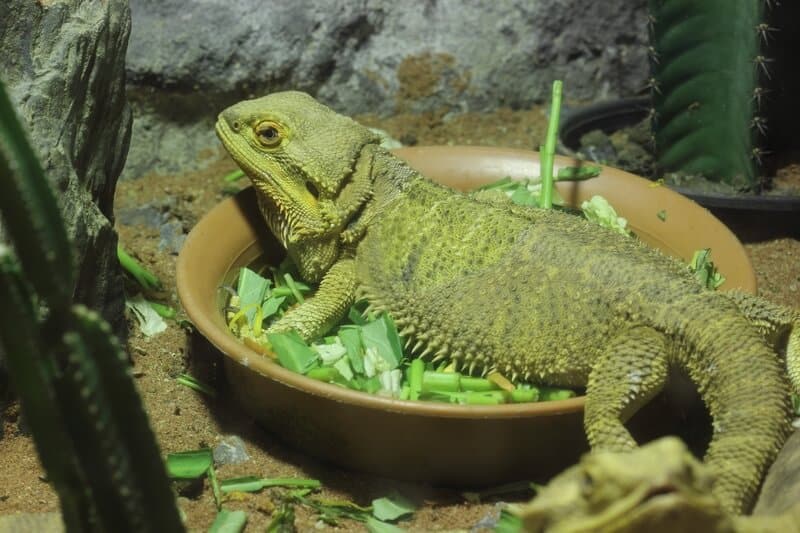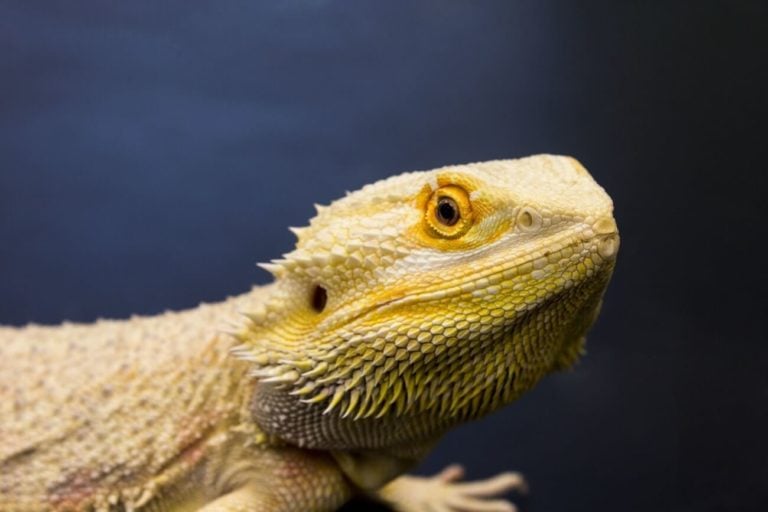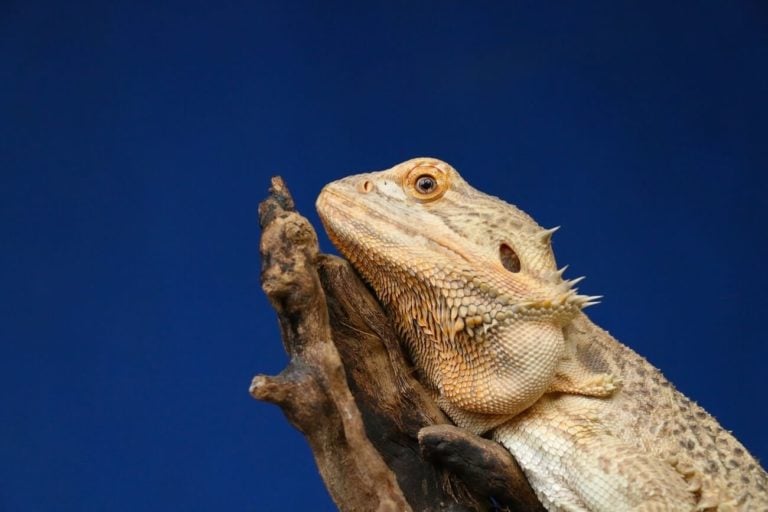It’s quite common for newer owners to wonder if bearded dragons can eat kale or not. This veggie is quite healthy for humans and many of us have it handy in our kitchen at all times.
But can bearded dragons have kale?
Read on to find out!
Table of Contents
Can Bearded Dragons Eat Kale?
Despite the widespread hype about this green “superfood,” kale does have a lot to offer your beardie.
Bearded dragons can eat kale in moderation. It shouldn’t be the only thing you feed them, but it can play a valuable role in fulfilling their dietary needs.
Is It Good For Them?
Kale’s value in a bearded dragon diet is often a point of contention among owners. Some enthusiasts praise the leafy green while others avoid it like the plague!
The truth is that eating kale is better for your bearded dragon than many other vegetables.
Kale is a nutrient-rich green that contains loads of vitamins and minerals. It has all the critical “lettered” vitamins like E, A, K, and C.
Vitamin A is a crucial micronutrient that supports their immunity, vision, and reproductive health. Too much Vitamin A can be an issue, so it’s vital to cut back on the supplements if your bearded dragon is eating kale regularly.
Vitamin C also supports the immune system. It’s essential for overall development and tissue healing, too. Vitamin K works to regulate blood clots and enhance your lizard’s circulatory health.
Expert Tip: Beyond the vitamins, kale has plenty of minerals. It contains manganese and magnesium, which help with metabolism and brain health, respectively.
Many beardie owners praise kale’s calcium content as well. Bearded dragons need calcium in order to stay healthy and survive. When they’re in a human-made environment, the lizard’s ability to synthesize the vitamin they need to absorb calcium lowers.
You can provide supplements and UVB lighting to overcome those issues, but giving your beardie a natural source of calcium can make a huge difference.
Kale is particularly effective in this regard. Why? It all comes down to its calcium and phosphorus ratio.
This leafy green has a calcium-to-phosphorus ratio of about 2.4:1. Without getting too deep into the scientific side of things, this ratio is ideal because calcium isn’t overtaken by phosphorus. Your beardie can actually absorb the calcium, which may help prevent bone-related issues in the future.

Finally, another reason why it’s fine for bearded dragons to eat kale is that it’s low in calories and high in moisture.
Kale is nearly 90 percent water! While beardies can lap up water from a dish, this vegetable serves as another valuable source. It can help prevent dehydration and all the unwanted health issues that follow.
When it comes to calories, bearded dragons that have kale are less likely to be overweight (assuming you’re doing everything else right). Weight gain is a serious problem that can shorten your bearded dragon’s lifespan. A cup of kale only has about 33 calories, so it’s a healthy snack that will keep your beardie nice and fit.
How Much Kale Should A Bearded Dragon Eat?
So, bearded dragons can eat kale. But should you consider making it a regular part of your pet’s diet?
Kale is a fantastic food for beardies in moderation. Note the “in moderation” part! You should only provide kale about two or three times a week.
Expert Tip: Not only that, but you shouldn’t serve your beardie kale on its own. The green needs to be part of a vegetable medley filled with other diet staples and nutritious greens.
For all of the good kale does, some potential issues could arise from providing too much.
Earlier, we mentioned that kale was rich in Vitamin A. When a bearded dragon eats too much Vitamin A it could lead to vitamin toxicity. Symptoms of this include:
- Swelling
- Extreme lethargy
- Dehydration
- Unexpected weight loss.
That means you have to be careful about serving up too much of the Vitamin. If you give your beardie supplements with Vitamin A, consider scaling back whenever kale comes into the mix.
Another potential problem arises with kale’s oxalate content. Like phosphorus, oxalates prevent proper calcium absorption. They combine with the calcium molecules, which stop the much-needed mineral from entering the bloodstream.
The good news is that kale is very low in oxalates. There are only about 20 milligrams of oxalates in 100 grams of the green stuff. For some perspective, the same amount of spinach has 970 milligrams of oxalic acid!
Despite the low concentration of oxalates, they still pose a threat. If your bearded dragon is eating kale every day they could start to suffer from calcium issues.
Another thing to be wary of is the moisture content. Hydration is essential for good health, but it is possible to overdo things.
Beardies are prone to diarrhea. Remember, kale is about 90 percent water. So, diets that only consist of kale can wreak havoc on your lizard’s digestive system!
Use kale strategically when adding it to your bearded dragon’s diet. Always keep their meals varied and make sure to include other beneficial foods to even things out.
Preparing Kale For Your Beardie
If it’s time for your bearded dragon to start eating some kale, there are some responsibilities you’ll need to take care of. Here’s how to prepare it!
Fresh Or Frozen?
The first decision to make is whether you should provide fresh or frozen kale.
Fresh kale tends to be a little more expensive and prone to spoiling. Meanwhile, frozen kale is easy to stockpile and always have on hand.
So, which is the better choice?
Without a doubt, fresh kale is your best bet. Try to provide raw kale whenever possible. It’s more nutritious and hasn’t been marred by any treatment processes just yet. Many frozen greens are blanched or boiled, which could impact the nutritional density.
If you want to provide the very best for your beardie, choose an organic product! Organic kale is free of pesticides and herbicides, which could ultimately impact the health of your pet bearded dragon.
Expert Tip: Bearded dragons can eat kale that’s frozen if you don’t have any fresh bundles available. Just make sure that it’s completely thawed before you serve it up. Frozen chunks could present a choking hazard for your pet.
Cleaning
Make sure you take the time to clean fresh kale.
Even if it’s an organic product or one that’s marked as “pre-washed,” washing kale before your bearded dragon eats it should be a top priority. There’s always a chance that bugs and debris could be lurking between those curly leaves.
This doesn’t have to be a time consuming process. Simply give the greens a good rinse. The goal is to eliminate any dirt or residue that could harm your bearded dragon.
Cutting
Next, you must cut the kale before your bearded dragon eats it. Kale grows on thick stalks. It’s better to ditch the stems.
They’re far too firm and fibrous. While some bearded dragons can digest them without a problem, the potential health risks aren’t worth the trouble.
Remove the leaves from the stalks. Then, chop them up into fine, manageable pieces.
Serving
Add the kale to the meal mixture you created, and it’s ready to serve!
Place the meal into the dish and let your beardie go to town. If your lizard suffers from dehydration, you can also mist the meal with fresh water. Otherwise, the greens should be more than enough to entice your bearded dragon.
Can Bearded Dragons Eat Cooked Kale?
Bearded dragons can eat cooked kale and won’t suffer any ill effects from eating it. However, it’s not going to benefit them very much!
Heat depletes kale of its lauded nutrients. Some will remain, but cooked kale is a shell of its former self as far as nutritional content goes!
Always stick to raw fresh kale. It’s a much healthier option that will have a positive effect on your reptile’s overall well-being.
Conclusion
By now it should be clear that bearded dragons can have kale, but it’s important for you to limit their intake and prepare it well.
As long as you stick to the recommendations above, your bearded dragon should be able to have kale without any issues! As always, if you have any questions we’re more than happy to help.



